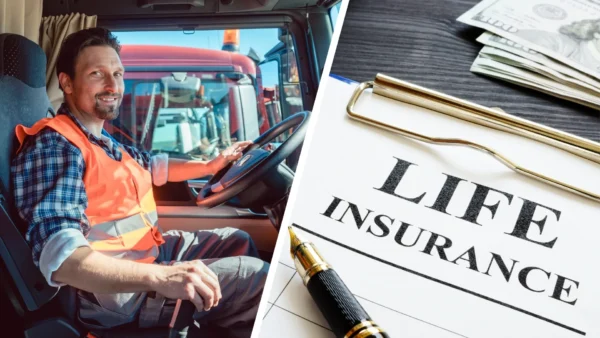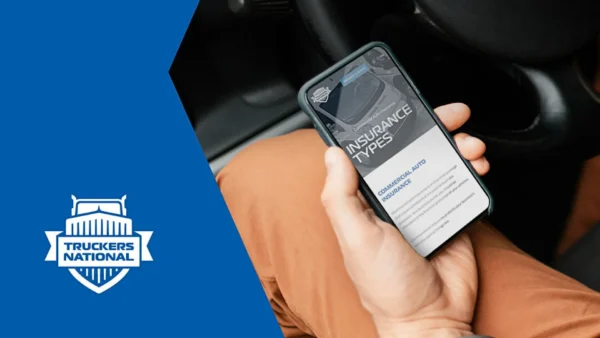06.04.24
When Do You Need Commercial Vehicle Insurance?
According to the Bureau of Transportation Statistics, a crash occurs approximately every 7.8 seconds in the United States. Despite advances in safety measures and vehicle technology, road accidents continue to be a leading cause of death and damage. The risk is especially high for professional drivers like owner-operators, making commercial insurance, particularly commercial vehicle insurance, not just a necessity but a crucial requirement.
Without appropriate insurance coverage, owner-operator drivers and fleet owners can face significant financial risks. Accidents can lead to costly repairs and liability claims while lacking proper insurance could result in legal troubles and potential loss of business opportunities. Whether you’re handling last-mile delivery or managing a fleet, ensuring your cargo van is adequately protected can save you from many headaches down the road.
What is Commercial Vehicle Insurance?

Commercial vehicle insurance is a policy designed specifically to protect vehicles used for business purposes. Unlike personal auto insurance, which covers personal use, commercial vehicle insurance addresses the unique risks and needs associated with business operations. It typically covers a wide range of vehicles, including cargo vans, trucks, and trailers used in various industries. This insurance protects against damages, theft, liability claims, and other potential losses that can occur during business operations.
One of the main differences between personal and commercial vehicle insurance is the level of coverage. Personal auto insurance policies often have limitations when it comes to business use and may not cover accidents that occur while the vehicle is being used for work purposes. In contrast, commercial vehicle insurance provides broader coverage tailored to the specific needs of business activities, ensuring that your cargo van is protected while you’re on the job.
Commercial vehicle insurance often includes options for higher liability limits, specialized coverages like cargo insurance, and protections against uninsured or underinsured motorists. These features are particularly important for freight and delivery sectors, where the risks and potential financial impacts are significant.
Scenarios Requiring Commercial Vehicle Insurance
Commercial vehicle insurance is essential in various business scenarios. For instance, owner-operators handling valuable or sensitive cargo need commercial vehicle insurance to cover potential damages or losses during transit. Contractors hauling tools or technicians transporting specialized machinery also require commercial vehicle insurance to protect their assets against theft, damage, or accidents. This type of insurance provides peace of mind and financial security for owner-operator drivers.
Expedited freight is another sector where commercial vehicle insurance is essential. Any delay or mishap can lead to significant financial losses and damaged client relationships. Good commercial vehicle insurance coverage for your cargo van ensures that unexpected incidents don’t derail your business operations. Similarly, in last-mile delivery, comprehensive insurance is necessary to manage risks effectively.
Industries like logistics, construction, and mobile services often rely heavily on commercial vehicles. For fleet owners managing multiple vehicles, commercial vehicle insurance protects each vehicle in the fleet, safeguarding the business from potential liabilities and financial setbacks. This coverage allows fleet owners to maintain smooth operations and focus on growing their business. For owner-operators, having proper insurance is also a smart business strategy. It shields them from unforeseen expenses and legal troubles, ensuring their livelihood is secure.
Legal Requirements and Compliance
Both state and federal regulations mandate that commercial vehicles carry specific levels of insurance coverage to operate legally. These laws are designed to protect the public and ensure businesses can cover any damages or liabilities resulting from accidents.
At the state level, the minimum insurance requirements can vary by jurisdiction. Each state sets its own standards for the amount and type of coverage needed for commercial vehicles. For example, some states may require higher liability limits for vehicles used in expedited freight or last-mile delivery services than others. It’s essential to check your state’s specific requirements to ensure compliance.
Federally, the Department of Transportation (DOT) has established guidelines for commercial vehicle insurance. For interstate operations, the Federal Motor Carrier Safety Administration (FMCSA) mandates minimum liability coverage. This applies to owner-operator drivers and fleet owners transporting goods across state lines. The required coverage amounts depend on the cargo type and the vehicle’s weight.
Non-compliance with these legal requirements is synonymous with severe penalties. Businesses that fail to maintain the required insurance coverage may face fines, suspension of their operating authority, and even legal action. Additionally, if an accident occurs and the business is found to be uninsured or underinsured, the financial consequences can be devastating.
Meeting legal requirements is not just about avoiding fines. It’s more about protecting your business. Adequate commercial vehicle insurance ensures you can cover any damages or liabilities, safeguarding your assets and maintaining your reputation. For owner-operators and fleet owners, staying compliant with insurance regulations is fundamental to running a successful and responsible business.
Factors Influencing Commercial Vehicle Insurance Rates
It’s not a secret that insurance rates may vary by client. There are several factors influencing the rates for commercial vehicle insurance, which understanding can help owner-operators and fleet owners manage their insurance costs effectively.
Type of vehicle
Cargo vans, trucks, and trailers each have different risk profiles and coverage needs. Insurance for cargo vans may be less expensive compared to larger, more hazardous vehicles used in expedited freight.
Vehicle’s usage
Vehicles used for last-mile delivery or frequent, long-distance trips generally have higher insurance rates due to increased exposure to potential accidents. The type of cargo carried can also impact rates. Transporting high-value or hazardous materials increases risk, leading to higher premiums.
Driver’s record
Owner-operator drivers with clean records often benefit from lower insurance rates. Conversely, a history of accidents or traffic violations can increase premiums. Fleet owners should ensure their drivers maintain good records to keep overall insurance costs down.
Location
Operating in high-traffic urban areas or regions with higher crime rates can increase insurance costs. Conversely, businesses based in areas with less traffic and lower crime may enjoy lower premiums.
Safety tools
Regular maintenance, safety features, and adherence to safety protocols demonstrate a commitment to minimizing risk. This proactive approach can lead to discounts and lower overall costs.
Tips for Lowering Commercial Vehicle Insurance Costs

Reducing commercial vehicle insurance costs without compromising coverage is a dream of every owner-operator and fleet owner. Here are some practical tips to help you save on insurance for your cargo van.
Bundling policies
Many insurance providers offer discounts when you combine multiple types of coverage, such as commercial vehicle insurance and general liability insurance. Bundling can lead to significant savings and simplify your insurance management.
Investing in safety features
Installing anti-theft devices, GPS tracking systems, and dashcams can reduce the risk of theft and accidents. Insurance companies often provide discounts for vehicles equipped with these safety enhancements.
Clean driving record
Encourage defensive driving habits among your drivers and consider enrolling them in defensive driving courses. These courses can improve driving skills and often lead to lower insurance premiums. Additionally, some insurers offer discounts for drivers who complete these programs.
Regular vehicle maintenance
Well-maintained vehicles are less likely to break down or be involved in accidents. To keep your cargo van in top condition, ensure it undergoes routine inspections and necessary repairs.
Comparing offers
Rates can vary significantly, so shopping around and finding the best deal is essential. Use online tools or work with an insurance broker to get multiple quotes and compare coverage options.
The Role of Risk Management in Commercial Vehicle Insurance
Effective risk management is half the battle in reducing accidents and insurance claims. Implementing comprehensive risk management strategies is an effective way for owner-operators and fleet owners to enhance safety and reduce financial risks.
Regular training
Providing ongoing education on safe driving practices and defensive driving techniques can significantly lower the likelihood of accidents. Driver training programs help ensure that all drivers are well-versed in handling various road conditions and emergencies.
Implementing safety protocols
Establishing clear guidelines for vehicle operation, routine inspections, and maintenance schedules helps prevent mechanical failures and ensures that vehicles are always in optimal condition. For owner-operator drivers, adhering to these protocols can lead to safer driving and lower insurance costs.
The use of technology
Telematics systems and similar technologies help monitor driving behavior in real-time, providing data on speed, braking, and other critical factors. This information allows fleet owners to identify risky driving habits and address them promptly. It can also be used to reward safe drivers with incentives, further promoting a culture of safety and creating a safer driving environment.
Understanding Policy Coverage Options
Commercial vehicle insurance policies offer various coverage options to meet the diverse needs of owner-operators and fleet owners. Each option is essential for protecting your business against financial and reputational risks.
Liability coverage
The most basic and required by law covers bodily injury and property damage you may cause to others in an accident. For owner-operator drivers, it provides a layer of protection against costly claims that could arise from collisions.
Collision and comprehensive coverage
Collision coverage pays for damages to your cargo van resulting from an accident, while comprehensive coverage handles non-collision incidents like theft, vandalism, or natural disasters. This type of coverage is particularly beneficial for those in expedited freight and last-mile delivery, where the risk of damage is higher.
Cargo insurance
It protects against loss or damage to your cargo, ensuring that your clients’ goods are covered while in transit. For example, if you’re delivering high-value items, having cargo insurance can prevent significant financial losses in case of an accident or theft.
Uninsured/underinsured motorist coverage
This one protects you if you’re involved in an accident with a driver who doesn’t have sufficient insurance. Given the unpredictable nature of road incidents, this coverage ensures you’re not left with out-of-pocket expenses.
The receipt of the right insurance coverage varies by the nature of your business operations. For instance, a fleet owner might prioritize higher liability limits and comprehensive coverage to protect multiple vehicles, while an owner-operator might focus on cargo insurance to safeguard the goods they transport.
Conclusion
Commercial vehicle insurance is not just a legal requirement but a strategic decision that can safeguard your business against significant financial risks. For owner-operators and fleet owners, this insurance provides essential protection against accidents, theft, and liability claims, ensuring smooth operations and peace of mind.
The right coverage can make a substantial difference in handling unforeseen incidents and maintaining your reputation in the competitive logistics industry. Without appropriate insurance, the financial burden of accidents and repairs can be overwhelming, potentially leading to legal troubles and loss of business opportunities.
By choosing the right insurance policy, you can protect your assets, comply with regulations, and ensure the safety of your operations, making it an indispensable component of your business strategy. Stay informed about your insurance needs and make proactive decisions to keep your business protected.



